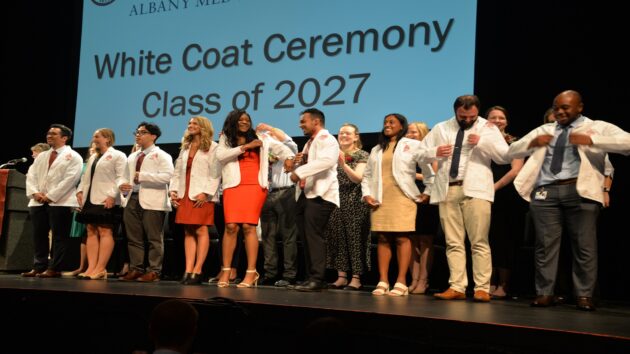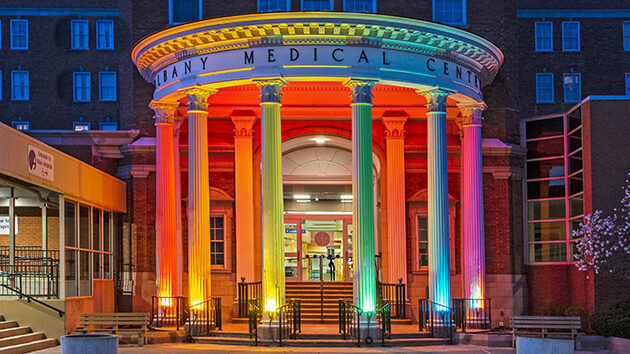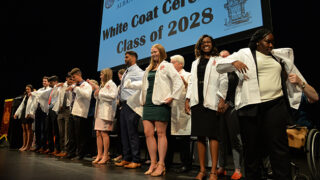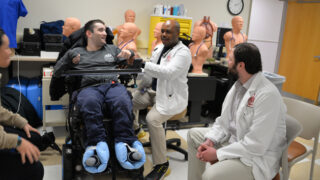Our History
Albany Medical College was founded in 1839 with an initial enrollment of 57 students. Despite the many changes and developments that have occurred over the years, the College still maintains a policy of limiting enrollment to a small group of carefully selected students.
Each year, Albany Medical College confers more than 200 degrees in Medicine (MD), Nurse Anesthesiology, Physician Assistant Studies, Bioethics, and Biomedical Sciences.
Albany Medical College is one of 135 nationwide chapters of the Alpha Omega Alpha medical honor society. Founded in 1902, AOA is the nation's premier medical society and is dedicated to upholding the highest standards in the profession and art of healing. Read the latest AOA Theta Chapter newsletter.
Our Clinical Facilities
Albany Medical Center is northeastern New York’s only academic medical center and is one of the largest private employers in the Capital Region. It incorporates the 766-bed Albany Medical Center, which offers a wide range of medical and surgical services. Albany Medical Center is the cornerstone of the Albany Med Health System, whose other members include Columbia Memorial Health, Saratoga Hospital, and Glens Falls Hospital. Combined, these four hospitals offer 1,520 beds, more than 800 physicians, and 125 outpatient locations throughout the Capital Region. Our mission focuses on patient care, research, and education.
The Bernard & Millie Duker Children's Hospital, located within Albany Medical Center, is the region's only children's hospital. It's the referral center for all seriously ill and injured children from 25 counties across upstate New York and western New England. The Massry Family Children's Emergency Center, which is the region's only Level 1 pediatric trauma center. The children's hospital includes the Melodies Center for Childhood Cancer and Blood Disorders, the highest level Neonatal Intensive Care Unit, the region’s only Pediatric Intensive Care Unit, and more than 40 subspecialties.
Commitment to Diversity
We are committed to diversity, equity, and inclusion. We strive to have a class that represents diversity in its many dimensions.
We define diversity in the broader sense meaning the inclusion of all people regardless of ethnic and racial background, socioeconomic background, geographic (urban and rural), gender, gender identity, sexual orientation, religious beliefs, age, physical disabilities, and other personal attributes along the spectrum of diversity that can contribute to a welcoming, inclusive culture across the Medical College. Understanding and recognizing that disparities exist in society today and can be clearly documented in health care, the College looks to develop and educate future physicians to be able to practice medicine in a way that supports the health care needs of all people.
Leading-Edge Training
Albany Medical College’s Patient Safety and Clinical Competency Center (PSCCC) houses an incredible collection of simulation and clinical training resources to educate students and health care professionals in a safe and dynamic setting. This facility is a critical component of our commitment to the highest standards of patient safety, while serving as a valuable resource.
Using lifelike manikins and other training tools, as well as role playing with trained actors to simulate patient exams and consultations, students practice hands-on medicine in a safe but realistic medical setting. The PSCCC allows students to develop excellent diagnostic, clinical, and communication skills.
Strong Commitment to Service Learning
Service learning is an important part of our medical school curriculum designed to expose students to the challenges facing underserved communities to complement classwork and strengthen not only medical skills, but compassion and commitment to improving the health of their community.
This requirement is in place for all four years of medical education.
Unifying our System
The Albany Med Health System is in the process of launching Epic. With Epic, we are building a unified electronic medical record (EMR) that will increase collaboration and communication across our campuses, paving the way for more efficient, seamless patient care.
Our goal is to provide seamless, high-quality care to our communities no matter where they go within the System, and improve the experience for our own employees. Adopting standard solutions at each campus will improve integration and enhance efficiency every step of the way.






